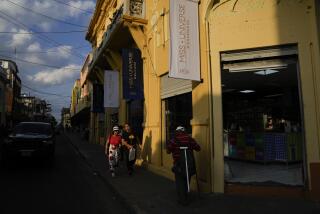Nigerian Spotlight Shifts From Beauty to Ugliness
- Share via
LAGOS, Nigeria — The Miss World beauty pageant was supposed to put this country, which its own Nobel laureate, Wole Soyinka, has called the “open sore” of the African continent, on the tourism map.
“We are overjoyed that these angels are in our midst,” Fatima Garbati, who heads a trade group of Nigerian tour operators, said when the contestants arrived this month. “They are going to show the world that Nigeria is safe for tourists and investments.”
That wasn’t to be. Instead of showcasing a welcoming environment, the pageant sparked riots between Muslim and Christian mobs that have left at least 105 people dead and closeted the beauty queens in their hotels under the watchful eye of the police and the army.
On Friday, the contest’s organizers pulled the plug on Nigeria.
“Organizers of the 2002 Miss World pageant have decided to move the grand finale to London, England,” the organizers said in a statement.
“This decision was taken after careful consideration of all the issues involved and in the overall interests of Nigeria and the contestants participating in this year’s edition,” it said. The decision came even though organizers insisted earlier in the day that the show would go on in Nigeria despite three days of rioting.
There was no indication whether the move would bring a halt to the violence. The clashes, which have seriously injured more than 500 people, erupted Wednesday in the northern city of Kaduna. On Thursday night, authorities reported that the violence had spread to the capital, Abuja, where the pageant was to be held Dec. 7. Thousands of Muslim youths armed with knives and machetes looted stores, attacked motorists and caused a stampede less than a mile from where the contestants are lodged.
“Nigeria is tearing itself up again,” said Lucy Uche, a bank teller in Lagos, the country’s commercial capital. “This was bound to happen. All we needed was a match.”
That match was struck by Isioma Daniel, a columnist with ThisDay, an independent daily newspaper based in Lagos.
Addressing Muslim leaders who say it is immoral to waste money and attention on skimpily dressed beauty queens, Daniel asked, “What would Muhammad think?”
“In all honesty, he would have probably chosen a wife from one of them.”
The newspaper published a lengthy front-page apology Thursday, saying the portrayal of Islam’s prophet was “not only unjustified but utterly provocative.” A day earlier, angry Muslim youths torched ThisDay’s Kaduna office.
On Thursday, rampaging Muslim mobs set ablaze churches and houses belonging to Christians in Kaduna. In ensuing clashes, Christian and Muslim mobs stoned each other with rocks and bottles and hacked each other with knives and machetes. Several bystanders were set on fire -- and burned to death.
A witness reported Friday that 12 charred bodies were still lying in downtown Kaduna, where a 24-hour shoot-on-sight curfew was being enforced by heavily armed security forces.
The Miss World pageant has exposed Nigeria’s fragile religious sensitivities. In the last few years, many northern states have embraced Islamic law, sparking tensions with their Christian residents and the predominantly Christian south. Two years ago, more than 2,000 people died in ethnic and religious clashes in Kaduna state.
The religious divide in Nigeria received international attention recently when an Islamic court ordered that Amina Lawal, 31, of Katsina state be stoned to death for having a child out of wedlock.
A handful of contestants -- from Panama, Denmark, Costa Rica, Switzerland and South Africa -- answered calls to boycott the event in the wake of the sentencing, but the Nigerian government has assured the contestants that no stoning will be carried out.
Last week, officials trotted out Lawal, who pleaded for the contestants not to boycott the pageant.
The U.S. contestant, “Miss Stars & Stripes” Rebekah Revels, did not boycott the pageant and arrived in Nigeria last week. Earlier this year, Revels made news in the Miss America contest when she filed a lawsuit against the North Carolina state pageant seeking to regain the title she gave up after an ex-boyfriend said he had topless photos of her. On Friday, television stations in Nigeria juxtaposed coverage of the riots with previously taken pictures of the beauty queens sipping drinks, watching a yachting regatta and being entertained by cultural troupes.
Activists say the millions of dollars that the government poured into the pageant could have been used to repair collapsing roads and bridges or provide other services for the 70% of the country’s 129 million people who earn less than a dollar a day.
Critics note that the contestants were conspicuously kept away from Lagos, which is bedeviled by extreme congestion, massive poverty and soaring crime.
Despite the controversy surrounding the pageant, many Nigerians say they hope to keep the crown that 20-year-old local beauty Agbani Darego won in South Africa last year.
Under an overpass in the crowded Ikeja neighborhood of Lagos, Shola Oluyemi and several friends were discussing the pageant while waiting four hours for their hair to be braided with synthetic fiber.
Oluyemi, a 21-year-old student at Lagos State University, said she hopes this year’s Nigerian contestant, Chineye Ochuba, wins even though the competition isn’t about “natural beauty.”
“These girls who are here are artificial beauties,” she said, punching the air for emphasis. “They’re too skinny and they wear too much makeup. If they want to see real beauties, they’ve come to the right place -- Nigeria.”
In Kaduna, Red Cross workers were picking up bodies and treating the injured. Hundreds of people were unable to reach their homes as the curfew was being tightly enforced.
Relief officials were preparing for more violence.
“We cannot rule out the spread of this crisis to other parts of the north,” said Patrick Bawa, a Red Cross spokesman.
More to Read
Sign up for Essential California
The most important California stories and recommendations in your inbox every morning.
You may occasionally receive promotional content from the Los Angeles Times.












